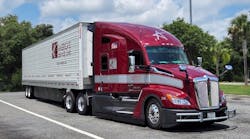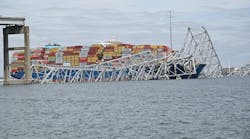The Federal Highway Administration (FHWA) is putting the final touches on a long-term strategy it hopes to unveil next year to completely overhaul the “safety culture” around motor transport in the U.S. The plan – titled “Toward Zero Deaths: A National Strategy on Highway Safety” (TZD for short) – is based on a 25-year horizon and seeks to re-engineer vehicles, roadway design, enforcement policies, and especially driver attitudes to make what Jim Toole, FHWA Associate administrator, calls “significant” reductions in highway fatalities and injuries.
Though annual highway fatalities in the U.S. declined to “a record low” of 33,808 in 2009, according to the National Highway Traffic Safety Administration (NHTSA), Toole said “the fact that we are ‘only’ killing just over 33,000 a year is not cause for celebration.”
See video about the FHWA's new plan
Speaking at a special conference on traffic safety at the Swedish embassy in Washington D.C. last week, Toole explained that FHWA’s “zero death” focus will require a “different way of thinking” about roadway, vehicle, and driver safety policies – and will demand strategic changes far beyond the incremental “day-in and day-out” steps pursued in the past.
One example would be far wider use of “roundabouts” (also known as “rotaries”) to manage traffic at roadway intersections, rather than traffic lights. “It’s very hard to get killed in a roundabout, vs.the ‘T-bone’ style crash we see in standard U.S. intersections today,” Toole said. “That’s one example of this shift in traffic safety thinking here.”
Another is more integrated planning of roadway design and construction between national, state, and local agencies, he said, along with more “accountability” for roadway designs through better data collection.
FHWA began crafting it’s “Toward Zero Deaths” plan at the end of 2009, then conducted a series of webinars and meetings with over 120 different groups such as the American Association of State Highway and Transportation Officials (AASHTO), the American Road & Transportation Builders Association (ARTBA), and others this year to help finalize it.
The agency is also drawing heavily from a similar long-range strategic plan Sweden put in place back in 1997 called “Vision Zero.”
Toole said the “culture” aspect of FHWA’s plan is critical because people make decisions in contexts that are strongly influenced by their social environment. “It is critical that we seek to improve transportation safety by influencing these decisions by transforming cultures,” he explained.
FHWA noted in a briefing paper on its TZD strategy that traffic crashes are not the result of isolated factors such as an icy road, but rather the combination of factors such as a driver deciding to speed on an icy road.
The impact of a crash may be focused on the driver, but the factors that precipitated the crash may reside at higher layers in the system including vehicle, traffic, infrastructure, environment and society.
“We need to recognize that the events that result in a crash happen in the context of society-- the beliefs and attitudes society has toward traffic safety,” FHWA said in its paper. “Unless we tackle the outer shell of this system, we are not going to get the change we want inside the system … because attitudes not only affect people’s own behaviors, but their views as citizens and their support for public actions (e.g., laws, enforcement actions, investments) aimed at improving safety.”
See video about the FHWA's new plan
Toole said such changes will not happen overnight and compared this FHWA “culture change” strategy to the decades-long initiative to reduce tobacco smoking in the U.S.
“We recognized that smoking was a broad health issue and a key part of the anti-smoking effort was to change perceptions from it being ‘your problem’ to ‘my problem,’” he explained. “We think there’s a lot of alignment between the anti-smoking campaign and this traffic safety issue.
“We also believe, by taking this broad approach to change the traffic ‘safety culture’ in the U.S., we can halve the annual number of projected fatalities by 2020,” Toole added.




